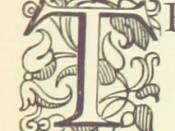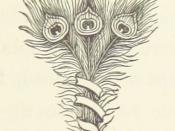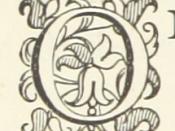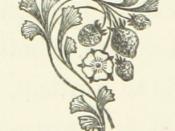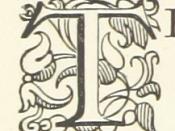Albert Camus', 'The Outsider', explores death and existence in a unique and provocative manner. Death is the beginning, middle and end of the novel and this highlights the importance of death in the world as seen through the eyes of Camus. Camus' ideas are developed along the lines of his Absurdist philosophies. He derives that death is an inevitable conclusion to life, rendering life itself pointless. He looks at the 'Absurdity' of life and also examines society's traditional sombre reaction to death, in particular how a person who does not adhere to this type of response is alienated. Through the use of his own distinctive writing style, Camus enables the reader to adopt the perspective of Meursault and shows what makes him an 'outsider'.
Camus' Absurdist philosophy heavily influences the depiction of death in 'The Outsider'. Absurdism emphasises the meaninglessness of life and the irrationality with which events unfold.
Death is seen by Absurdists as an inevitable conclusion to existence, rendering human life pointless. Meursault is used by Camus to symbolise Absurdist views in the novel. His indifferent reaction to the deaths of his mother and the Arab embody the Absurdist attitude. When Meursault grasps the inevitability of his own death he becomes truly happy for the first time. Camus seems to be suggesting that embracing the inevitability of death, in the same way as Meursault, will lead to true happiness.
Camus uses the sun to symbolise and foreshadow death. At his mother's funeral, Meursault makes frequent reference to the sun - "The sun was already high in the sky" (p.20), "The glare from the sun was unbearable" (p.21). Again, before he murders the Arab, Meursault becomes acutely aware of the light from the sun and its radiant heat - "my head [was] ringing from the sun" (p.56), "scorching air" (p.59). Indeed, Meursault begins to see the glare of the sun everywhere and increasingly feels the oppressive heat weighing down upon him. "When Raymond handed me the gun, the sun glinted off it" (p.57). To make the use of the sun to foreshadow the Arabs death even more obvious, Meursault states that, "It was the same sun as on the day of mother's funeral..." (p.59).
In 'The Outsider', the sun is a powerful obstacle to Meursault. The sun preoccupies Meursault's mind whenever he is in its presence. It is an annoying distraction for Meursault, one which he is unable to banish; until he kills the Arab. In prison, where he is free from the sun, Meursault is finally allowed the freedom of mind to think clearly. The sun is used to symbolise death because its oppressive effects on Meursault are representative of the oppressive effects of death on society's wellbeing. Death is a cause of frustration and anger. However, society cannot ignore the confronting finality of death, just as Meursault cannot ignore the overpowering effects of the sun. Only when Meursault announces that he is "forever indifferent" (p.116) to the sun is he free from its impression. In the same way, through the symbolism of the sun, Camus suggests that society must learn to accept the inevitability of death to free itself from death's oppression.
The structure of 'The Outsider' is heavily influenced by death. The events of the plot are driven by three important deaths, the death of Meursault's mother, the death of the Arab, and the death of Meursault himself. These deaths serve as the introduction, climax and conclusion of the novel, respectively. In each case, Meursault's reaction to death is unconventional. For example, he does not express sadness at the death of his mother, nor remorse at his murder of the Arab, nor despair at his impending execution. Each of these reactions is seen as a threat to society and alienates Meursault from others. This does not concern him at all as he does not strive for social acceptance. The death-centric structure of 'The Outsider' allows Camus to press his ideas on death to the reader. The over-exaggerated presence of death in the novel highlights its importance, in Camus' eyes, to society. Death both surrounds and is central to the story of Meursault. However, he does not allow its overbearing presence to perturb him. Meursault is indifferent to death. Camus seems to suggest that an acceptance of the inevitability of death, marked by indifference, is the key to freeing oneself from its burden.
In 'The Outsider', Absurdism clashes with conventional social views regarding existence and death. Meursault often enters into confrontations with others at odds with his Absurdist stance. Meursault is first confronted by the magistrate who "took out a silver crucifix and came back towards [Meursault] brandishing it" (p.68). The crucifix, symbolic of Christianity and rational belief systems, is casually rejected by Meursault. He says, "â¦I hadn't followed his argument at all well, firstly because I was hot and his office was full of huge flies which kept landing on my face, and also because he frightened me a bit" (p.68). This quote indicates Meursault's disinterest in the conventional belief of the universe's rationality. It also reveals that he is also a little "frightened" (p.68) by the concept of the universe having structure. A second conflict occurs between Meursault and the prison chaplain: '...something exploded inside me...I'd grabbed him [the chaplain] by the collar of his cassock...He seemed so certain of everything, didn't he?...He couldn't even be sure he was alive because he was living like a dead man.' (p.115). Here, Meursault becomes angry at the chaplain's dismissal of his Absurdist views. Meursault feels that the only certainty in life is death; as he says, "...I was...sure of the death that was coming to me. Yes, that was all I had.' (p.115).
The chaplain and the magistrate's reactions to Meursault's Absurdism are typical of society's reactions. In his refusal to accept Christianity, Meursault undermines the chaplain and the magistrate's self-assurance in the rationality of the universe. His views render their lives meaningless - a prospect that they are unable to face. Therefore, it seems that neither the magistrate nor the chaplain have the same degree of certainty in their 'rational' beliefs that Meursault does in his Absurdist beliefs and the inevitability of death. Thus, it appears that there is more certainty in the Absurd than there is in conventional 'rational' beliefs. Camus is trying to say that embracing the inevitability of death and the Absurd will lead to greater certainty.
Meursault's isolation from society makes him a useful vessel for presenting Camus' views on death to the reader. Meursault's name, derived from the French 'Je Meurs', meaning 'to die', suggests a strong connection with death. He is apathetic and indifferent and is thus seen as a threat to society. To quote the prosecution lawyer: '[Meursault's] heart is so empty it threatens to engulf society' (p.98). Meursault is strongly drawn to the physical world, rather than the social world. He is acutely sentient of his surroundings. This is reflected in his keen observations of nature - "...the sky was full of red streaks. And the breeze coming up from the hills had a salty tang to it" (p.17). In addition, the Meursault's relationships with others are largely devoid of any interpersonal connection. Even Meursault's relationship with Marie is destitute of any emotional involvement from him; demonstrated by his casual acceptance of her marriage proposal. He tersely tells Marie, "it really didn't matter and that if [you] wanted to, we could get married" (p.44). However, perhaps Meursault's most important character trait is his honesty. He remains honest even when the consequences of honesty are entirely detrimental. For instance, in the courtroom, he does not express remorse, as is often done by convicted criminals (genuine remorse or otherwise), to reduce the extent of his punishment. 'I didn't much regret what I'd done...I'd never really been able to regret anything' (p.97).
Meursault's detachment from society is reinforced by Camus' writing style. Camus' style reflects the personality of Meursault and enables him to effectively present Camus' views on death. The short, emotionless sentences reflect Meursault's detachment. The detachment allows the reader to form objective judgements of the characters and situations. As a sign of his detachment, Meursault often refers impersonally to other characters. For example, he refers to Salamano as "the old man" (p.47). Camus' diction is simple and he does not often use literary techniques such as similes and metaphors, except when describing the murder of the Arab and during the final passages. The concise sentences and simple diction combine to give the text a 'report'-like effect. He describes what he sees without colouring his descriptions with emotion. Any judgements he passes are completely separate from description. During the first part of the novel, Meursault passes minimal reflection upon what he sees. In the second part however, his imprisonment allows him time to contemplate the events in his life. This leads to greater self-awareness. The character of Meursault does not by himself reveal anything about the fact of death. He is the embodiment of Absurdism and is therefore a useful vehicle for presenting Camus' ideas regarding death and the Absurd.
The introductory death of Meursault's mother sets the tone for the novel. The death of Meursault's mother is mentioned in the first sentence of the novel, "Mother died today" (p.9). Meursault sees his mother's death as more of a disruption to his routine than a great loss. This is reflected by his overall focus on the journey to the old people's home and his guilt at taking time off work; rather than on his mother. He says, "I'll catch the two o'clock bus and get there in the afternoon...and I'll come back tomorrow night...I asked my boss for two days off...I even said, 'It's not my fault.'" (p.9). Throughout his time at the old people's home, Meursault appears indifferent to his mother's death, referring to her as a "dead body, lying there among them [Meursault and his mother's friends]" (p.16). In addition, Meursault's mind often wanders to making detailed observations of surroundings, such as, 'I'd never noticed before what huge paunches old women can have' (p.15).
Meursault's indifference to his mother's death is an indication to the reader of the type of person he is. His detachment does not mean that he does not love his mother. It merely indicates that their relationship, and indeed any other relationships he has with people, is not important to him - at least on a personal level. During his trial, Meursault's indifference to his mother's death contributes to him being perceived as "...nothing but a monster..." (p.99). Camus uses Meursault's mother to exaggerate the impact of Meursault's apathy in the eyes of the reader. For example, if Meursault was to demonstrate the same indifference towards a stranger's death as he does towards his mother's death, it would be much less powerful for the reader. Through Meursault's indifference to his mother's death, Camus is trying to say that those who are not aggrieved by death are alienated.
The Arab's murder is a reflection of the Absurd. The Arab's death marks the end of the first section of the story. It is the climax of the story. The death is foreshadowed by sun-related imagery - "...the whole beach was reverberating in the sun..." (p.59) and "The sun was beginning to burn my cheeks..." (p.59). In the passages prior to the event, Camus intensifies the imagery. His imagery becomes strongly vehement - "The light leapt up off the steel...like a long flashing sword lunging at my forehead" (p.60) and "All I could feel were the cymbals of the sun...clashing against my forehead..." (p.60). The vehemence of Camus' imagery builds tension and suspense. Unusually for Camus, the lead up to the Arab's murder is abundant with simile and metaphor use. This is in contrast to his normally simple descriptions. For example, "...the dazzling spear...leaping up off the knife in front of me...was like a red-hot blade gnawing at my eyelashes and gouging out my stinging eyes" (p.60).
Meursault does not murder the Arab out of a desire to kill. His murder is a reflection of the Absurd. There is no reason behind his crime; it is simply a demonstration of the irrational order of events in the universe. Camus uses Meursault's murder to draw the reader into applying conventional logic on events which are illogical; in much the same way that the court misguidedly attempts to rationalise Meursault's actions. Once again, Meursault's indifference to the Arab's death reflects a greater universal indifference to death. Through Meursault's murder and indifference to the event, Camus tries to say that the universe itself is indifferent towards death.
Faced with his death, Meursault undergoes a paradigm shift in regards to his outlook on the world. Meursault is indifferent to death throughout the novel, that is, until he himself is faced with it. He realises that he does not want to die prematurely. He says, "I just couldn't accept such an absolute certainty [his death sentence]" (p.105). However, as he reflects on the subject; his attitude begins to change somewhat. Meursault begins to see the matter in an Absurdist light. Soon he comes to the conclusion that "it doesn't matter whether you die at thirty or seventy...other men and women...will go on living for thousands of years...Given that you've got to die, it obviously doesn't matter exactly how or when" (p.109). Meursault realises the inevitability of death. He arrives at peace with his execution. At the novel's conclusion, Meursault finally realises that the universe, like him is indifferent to existence, and he becomes happy. Earth related imagery enhances Meursault's euphoric mood at the very end of the novel - "The night air was cooling my temples with the smell of earth and salt" (p.116).
For the bulk of the novel, Meursault's awareness of the Absurd is largely subconscious. It influences his actions but he does not seem consciously aware of it until he begins reflecting on his life in prison. As Meursault consciously embraces the Absurd, he becomes happy and less burdened. He says, "I...laid myself open to the indifference of the world. And...I realised that I'd been happy, and that I was still happy" (p.117). Once again, Camus is trying to suggest that once the reader accepts the inevitability of death and embraces the Absurd, he will be truly happy.
Death plays a central role in 'The Outsider'. Using Meursault as a vessel for his ideas, Albert Camus presents his perspective regarding the fact of death in accordance with his Absurdism. Camus uses symbols such as the sun to represent death in the novel. Introducing, climaxing and concluding his novel with death allows Camus to relate death's overbearing presence in society. Camus examines the clash between his Absurdism and conventional social morality, stating how Absurdism brings greater certainty in beliefs. Camus' distinct writing style helps to reinforce his points and mirrors the mood of Meursault. Like Meursault, Camus urges the reader to accept the inevitability of death and embrace the indifference of the universe as that is the only way to achieve true happiness in life.
No Bibliography: My own analysis of "The Outsider".

